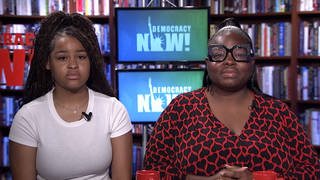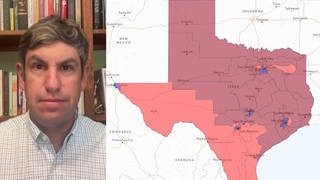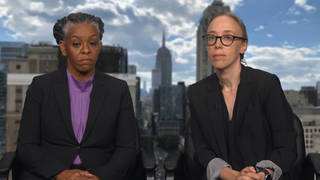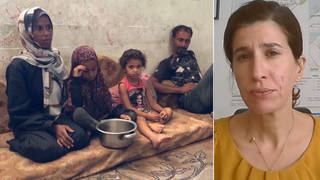
New York Governor David Paterson is facing increasing pressure from state Democrats to defend his actions or resign in the wake of allegations that he may have used his authority to influence a domestic violence case involving one of his top aides. As the pressure rises on Governor Paterson, we take a step back to look at the issue of domestic violence around the country with Terry O’Neill, president of the National Organization for Women. [includes rush transcript]
Transcript
AMY GOODMAN: New York Governor David Paterson is facing increasing pressure from state Democrats to defend his actions or resign in the wake of allegations that he may have used his authority to influence a domestic violence case involving one of his top aides. Last week the Governor announced his withdrawal from the gubernatorial race, but denied committing any ethical breach.
GOV. DAVID PATERSON: Today I am announcing that I am ending my campaign for governor of the state of New York. It has become increasingly clear to me in the last few days that I cannot run for office and try to manage the state’s business at the same time, and right now New York state needs a leader who can devote full time to this service. But I give you this personal oath: I have never abused my office — not now, not ever.
AMY GOODMAN: A report in the New York Times alleged that Paterson’s top aide, David Johnson, now suspended, attacked his girlfriend last Halloween, quote, “choking her, smashing her into a mirrored dresser and preventing her from calling for help.” On Monday the New York Times reported Governor Paterson had personally intervened in the case, asking two staff members to contact the victim the night before she was to appear in court to request an order of protection from Johnson. She did not show up in court.
In light of these revelations, the New York chapter of the National Organization for Women, which has been a longtime ally of Paterson, called on him to resign.
As the pressure rises on Governor Paterson, we take a step back to look at the issue of domestic violence around the country. I’m joined from Washington, DC by Terry O’Neill. She’s the president of the National Organization for Women.
We welcome you to Democracy Now!, Terry. First —-
TERRY O’NEILL: Thanks, Amy. I’m thrilled to be here.
AMY GOODMAN: It may surprise many that the National Organization for Women, long an ally of Governor Paterson, who has hailed him for his -— well, for his feminism, for supporting women, is now calling for his resignation.
TERRY O’NEILL: Sure, and the New York state NOW chapter made that decision. I’m sure it was not an easy decision for them to make. But the issue of domestic violence is just too important. It’s an issue that the National Organization for Women around the country, we have worked on for decades. And although it may not have been easy, I think it’s the right thing to do.
AMY GOODMAN: You, Terry O’Neill, have come out as a domestic violence survivor.
TERRY O’NEILL: Yes.
AMY GOODMAN: Can you talk about how you, yourself, decided to make your ordeal public and what happened to you?
TERRY O’NEILL: Sure. Actually, what happened to me happened a very long time ago. I was in my early twenties. I was newly married, and I was, frankly, in —- I suppose, in the universe of domestic violence, I was quite lucky. Newly married, the marriage wasn’t going well. I told my young husband, you know, “We need to get divorced.” And I experienced what has later become to be called “separation assault,” where it was a little bit like the Chris Brown incident, frankly, an assault done by an individual who was using violence to get what he wants. And in my case, it was he did not want me to leave the marriage.
I had enormous supports available to me. My parents were living in the same town. I moved into their apartment. So I was able to get into a safe space. I was able to continue working. This individual came to my place of employment only once and never came back again. I had everything going for me, so I was very, very lucky. What I have learned from that experience is that it’s crucial that women who are escaping violent relationships must have supports, multiple types of support.
You know, I didn’t go public with this until actually fairly recently, when I was working for a county government in Maryland, and that county was establishing a Family Justice Center dealing with domestic violence. And at that point, I was working with the sheriff’s department, setting up the protocols and so forth, and I thought it might be useful for me to tell them my story, because I wanted them to be very much aware of the self-image, I suppose, of women escaping violence.
The one thing that I remember experiencing in my early twenties was I did not want to be defined by that experience. I repeatedly told my family members, “I am not a battered wife. You know? I am a person who may have a career ahead of her. I am a person who is looking at graduate school. I am” -— it was very important to me to not be labeled as a person who has gone through this experience. So I felt that I could use my experience, as the Montgomery County was setting up this Family Justice Center, to help keep the awareness of the women who are coming to them for help. These are capable, intelligent women who are juggling an enormous number of challenges, more than most women perhaps need to juggle, and that there’s a huge element of, I guess, embarrassment, that women need to be recognized for their capabilities and not just for their, if you would, victimization.
AMY GOODMAN: Last week on Capitol Hill, Senate Majority Leader Harry Reid linked rising unemployment to increased violence against women and girls. This is what he said.
SEN. HARRY REID: I met with some people while I was home dealing with domestic abuse. It has gotten out of hand. Why? Men don’t have jobs. Women don’t have jobs either, but women aren’t abusive, most of the time. Men, when they’re out of work, tend to come — become abusive. Our domestic crisis shelters in Nevada are jammed. It’s the way it is all over the country.
AMY GOODMAN: That was Harry Reid. Your response to that, Terry O’Neill?
TERRY O’NEILL: Yeah, and you know, it’s — Senator Reid is absolutely right to talk about the money. When it comes to domestic violence, I think we do need to follow the money, in two ways.
First, in a household in which there is unemployment, the risk of domestic violence is significantly higher than in households where there is full employment. For one thing, when an abusive person is not employed, then the person who’s being abused has a harder time getting away from him. Right? He’s home all the time. He may be drinking. She’s finding it harder to create her safe plan and her means of exit, to get the kids OK, to find an apartment, to gather up the money for the first month’s rent and the security deposit and so forth, all the logistical things you need to do. So he’s home because he’s unemployed, makes it much harder for her to maneuver around to try to get herself and her children into a safe space.
Another piece of the economic issue that’s extremely important to remember is that women who are unemployed or underemployed are at significantly higher risk of domestic violence than women who are full-time employed at fair wages. I don’t think that it is a stretch to connect the dots between systemic wage discrimination against women — right? Women are paid 78 cents to the dollar. In communities of color it’s much worse. African American women are paid 64 cents to the dollar for white men; Latinas, it’s 58 cents. And the economic security of a woman is very much related to her ability to leave an abusive or violent relationship.
So the unemployment situation sort of comes at women with domestic violence issues from these two different perspectives. And I applaud Senator Reid for pointing that out. The thing that I think — the next step that we have to make, now that he makes that connection, we must not decrease expenditures on violence-against-women programs. In fact, when the economy suffers, that’s when public policy, I think, requires that we increase services for women escaping violence.
AMY GOODMAN: During last week’s healthcare summit at Blair House that President Obama presided over, New York Congress member Louise Slaughter noted that domestic violence is considered a pre-existing condition in eight states across the country. This is what she said.
REP. LOUISE SLAUGHTER: Pre-existing conditions absolutely has to go. It is cruel. It is capricious. And it is done only to enhance the bottom line. Eight states in this country right now have declared that domestic violence is a pre-existing condition, on the grounds, I assume, that if you’ve been unlucky enough to get yourself beaten up once, you might go around and do it again.
AMY GOODMAN: That was New York Congress member Louise Slaughter. Terry O’Neill, this is just astounding. Explain again what some health insurance companies consider — how they consider domestic violence a pre-existing condition.
TERRY O’NEILL: You know, I’ve never been able to get an explanation of why they do it. I assume it’s because it’s just an effort — it’s one more way of enhancing their bottom line. But it’s absolutely astonishing that —-
AMY GOODMAN: That if a woman’s been -—
TERRY O’NEILL: — a woman who has experienced —-
AMY GOODMAN: Go ahead.
TERRY O’NEILL: She can be -— right, she can be denied insurance completely, no health insurance available on the private market, if the insurance company says, “Oh, well, you’ve been a victim of domestic violence, therefore we’re not going to cover you at all.” And in eight states, the insurance company is permitted to say no coverage of anything. Right?
I don’t know where the insurance — I don’t know if they’re — I can’t imagine that there are statistical studies proving that somehow it is more expensive to insure a person who has been in a domestic violence situation. Clearly, this kind of pre-existing condition should be outlawed, must be outlawed immediately. And yeah, and I think that this is a recent phenomenon of insurance companies simply looking anywhere they can for profit. And this is one way they’ve done it. It’s completely outrageous.
AMY GOODMAN: I’m looking at a report from ABC News, how they describe the latest “controversial abortion bill in Utah meant to prevent planned assaults on unborn children may have opened a loophole that could allow women to be charged with murder if their reckless behavior causes miscarriages.” And on that issue, I wanted to bring in a second guest. Lynn Paltrow is the executive director of National Advocates for Pregnant Women.
This is an astounding bill and actually also relates to the issue of domestic violence. Can you explain?
LYNN PALTROW: Well, the way the statute is written, any action a woman undertakes, knowingly or recklessly, can result in a charge of homicide with a penalty of fifteen years. So a woman who is pregnant and stays with her batterer is arguably being reckless in staying there. And should she stay there, she could literally be charged with attempted feticide or murder, if there is a — if she survives and the fetus doesn’t. And I think your other guest can talk about why women do stay in those circumstances and why making them criminals for doing so is so unjust.
AMY GOODMAN: It’s really astounding when you play this out, because if a woman is afraid that she might not get health insurance, she won’t let people know that this has happened, Terry O’Neill.
TERRY O’NEILL: Well, sure. She won’t let people know that it has happened. It’s also the case that women who are in abusive relationships need to think carefully about what their options are, where can they go. There are communities where even if there is a shelter, that shelter is full for six months. You can’t get in for six months. So she needs to find — she needs to gather together the money, to move out, to find the apartment. It has to be in a neighborhood that has good schools for her kids and good services for her kids. She needs to be able to find a safe space. She needs to be able to get to a place where he can’t find her.
She needs to be able to go through the legal process to get the restraining order and the permission, in many states. Women who are being battered are not permitted to move to a safer place if it requires her to cross a state line, because he has a legal right to have access to the children. So if she lives, for instance, in Louisiana, as a case I’m familiar with, and a woman who had been battered and had lost her job in Louisiana, her parents in Arkansas said, “Come move in with us, and you can find a job there.” Oh, no, she wasn’t — that was not an option for her. She couldn’t cross state lines because of Louisiana law.
So there are all kinds of constraints on women’s ability to leave that relationship. And then you have Utah coming in and criminalizing her behavior.
How about if we take a step back and look at it from a different perspective and say, “Let’s provide services for women trying to escape violence, let’s provide realistic consequences to men who are violent toward women” — we don’t have nearly the kind of consequences that we need for men who are violent — ”and let’s begin changing the behavior of the men instead of trying to control the sexuality of the women”?
The man, the Utah legislator, as I understand it, who put this law in, he was asked, “Isn’t this really, you know, an anti-abortion measure?” And he said, “Listen, I am totally anti-abortion rights. I don’t want women to have any abortion rights, and I hope that this measure does restrict women’s ability to terminate a pregnancy when they want to.” He said, “I think the” — the Utah — he obviously is one who believes that the Utah legislature has more right to control a woman’s body than the woman herself does.
AMY GOODMAN: We’re going to continue this discussion, but we have to break for a minute. We’re talking with Terry O’Neill, president of the National Organization for Women — she’s in Washington, DC — and Lynn Paltrow, founder and executive director of the National Advocates for Pregnant Women, here in New York. We’ll be back in a minute.
[break]
AMY GOODMAN: Our guests today, Terry O’Neill, president of the National Organization for Women, and Lynn Paltrow, founder and executive director of the National Advocates for Pregnant Women.
Lynn, I’d like you to talk more about the Utah case. Again, summarize what it says. And then, it is not alone in this country, Utah, in passing laws that have this kind of effect on pregnant women, or considering laws, and I’d like you to go through them.
LYNN PALTROW: OK. Well, the Utah law was ostensibly passed in response to a particular event. And that’s often how anti-choice and fetal rights legislation gets passed, under the guise of “We’re just doing this little thing.” And this little thing is — involved a seventeen-year-old girl who was pregnant, whose boyfriend told her he would leave her if she continued to term. And in some act of absolute desperation, she apparently hired somebody to beat her up to cause her to lose the pregnancy. She survived. The baby survived. They arrested both the young man who beat her up and the young woman. The young man was charged with attempted feticide, and so was she. But when they realized that they really couldn’t apply the attempted feticide law to the girl herself, so outraged were they that they couldn’t lock up a seventeen-year-old for fifteen or more years, that they passed a law that purports to outlaw self-abortions.
First of all, you know, for people who claim to pass laws to promote a culture of life, it’s hard to imagine that, when they don’t value the life of also the life of this young woman. Anybody who is so desperate as to invite violence against herself — and she could have died from the beating — to think that a statute making that behavior a crime is going to deter such desperate behavior is pretty crazy, to begin with, and lacking in any common sense about — if you really want to value fetal life and maternal life, this is certainly not the way to do it.
One of the things the law reveals is that for many, many years, those groups who have been trying to overturn Roe v. Wade, the Supreme Court decision recognizing the right to choose abortion, have argued that if Roe is overturned, don’t worry, only the doctors are going to go to jail, not the women who, in seeking to control their reproductive lives, have abortions. Well, Utah has just lifted the veil on that, making very clear that women themselves will go to jail and for at least fifteen years, and life, in some circumstances.
But even beyond that, the law is written so broadly that it applies to any behavior a woman engages in knowingly, recklessly. And, you know, who gets to decide if what you’re doing is reckless is the arresting officer and the local prosecutor — not you, your heart, your minister; those people — and put you in jail. So a woman who is unable to leave a batterer could be charged.
Women who — in Iowa, they don’t even have a law like this on the books, but a young woman, after having a terrible argument with her — a husband from whom she was separated, got off the phone and went to go downstairs to see her children and fell down the stairs. She went to the hospital out of concern about her baby, got there, was really upset, hysterical, worried. And they started questioning her. And what they decided was her fall down the stairs was attempted feticide. And they arrested her and kept her in jail for several days, until the Iowa county attorney decided that their unprecedented and, frankly, illegal interpretation of the law couldn’t be applied to her, but only because she was in her second trimester and not her third trimester.
So I think people — when we give examples of women being arrested for staying with a batterer, people think these are slippery slope craziness. But we keep seeing cases like this. In fact, Utah, in 2004, arrested a woman who had given birth to twins, one of whom was stillborn, and they charged her with murder, because she had refused C-section two weeks earlier. And the theory was her refusal of the Caesarian section, Caesarian surgery, constituted murder. So right now there’s a law that’s been passed by both houses in Utah that would make miscarriages and stillbirths, because it applies to pregnant women from the moment they conceive.
One really interesting thing that people need to think about is that it is — people know that if a woman gives birth and then breastfeeds, it’s likely to continue the time where she won’t become pregnant again, while she’s breastfeeding. And apparently, one theory about why that works is that the hormones, that it — breastfeeding affects the body so that the fertilized egg can’t implant. That’s an abortion. That’s self-abortion. So if the state wants to set up a mechanism for policing pregnant women, Utah has done a very good job.
AMY GOODMAN: Louisiana?
LYNN PALTROW: Well, not Louisiana, but Mississippi. We look across the states. We see that our government is in deadlock about passing health insurance for people — healthcare reform for millions of people who need it. But state legislators are hard at work making it harder for pregnant women to access the healthcare they need and more likely for them and their healthcare providers to go to jail.
In Mississippi, there was a bill proposed to criminalize certain kinds of midwifery. The problem with that is, as we saw after Hurricane Katrina and after we saw in Haiti, that if your hospitals shut down, you need people who know how to deliver babies without electronic fetal monitors and surgical theaters and even epidurals. So you really don’t want to be making it a crime for certain kind of midwives to practice. But if a woman in a disaster area can’t access birth services, she also probably can’t access abortion services. And we know if she took measures into her own hands in Utah, she could go to jail for life.
In Nebraska, legislators, in the name of protecting the unborn from pain, argue that fetuses, after twenty weeks, experience pain. And their response to that is to outlaw all second trimester — to ban all second — third trimester abortions and to put the doctors who perform them in jail, even though, to the women who need them, they are heroes. We look at that, and we think, really? If you’re trying — if you believe that twenty-week fetuses experience pain to that extent, wouldn’t they also experience pain from electronic fetal monitors put through their scalps, from forceps deliveries, from pitocin-induced labor? And if your response to fetal pain is to outlaw something, then you’re going to also have to outlaw certain kinds of vaginal birth.
AMY GOODMAN: One of the participants in the Blair House Obama healthcare summit was Oklahoma Senator Coburn. His views on abortion?
LYNN PALTROW: Well, he has said that he believes that doctors who perform abortions should receive the death penalty. And in his state, women who experience stillbirths that have — the state claims was caused by something they did have been charged, in fact, with murder. In every state but South Carolina, and potentially Utah, those prosecutions lack any legal support. And if the woman is lucky enough to be adequately represented, eventually, perhaps years after she’s been in prison, she can get those charges dropped. But South Carolina, as a result of judicial activism, and now Utah, is making it possible to put women behind bars because they are either trying to go to term or because they take desperate measures not to.
AMY GOODMAN: Tom Coburn is a doctor.
LYNN PALTROW: Yes.
AMY GOODMAN: And was sued by a woman who charged that he sterilized her without her knowing it, that he had gone in to save her life, really — I think she had an ectopic pregnancy in a fallopian tube, and he removed that, but he removed the good tube, as well.
LYNN PALTROW: Interesting.
AMY GOODMAN: The case ultimately dismissed because she didn’t show up in court.
LYNN PALTROW: Well, we know more and more as Catholic hospitals become the only hospital in town. There are more and more reports of women who go to those hospitals with ectopic pregnancies. Those are pregnancies in fallopian tubes. The embryo can never survive. It’s not a question of an abortion; it’s a question of saving the woman’s life. And recently we got a call from a woman where she was in agonizing pain. The fallopian tube could explode, putting her life at risk. And the Catholic hospital said, “There’s still a heartbeat. Go home and wait.” And so, they force women to suffer unbelievable pain or to travel hundreds of miles to a hospital that will treat them as human beings, not as subjects of religious orthodoxy.
AMY GOODMAN: Is anti-choice legislation on the rise? Have things changed during the Obama years? Or I should say “year.”
LYNN PALTROW: Well, there’s no question. And this was, unfortunately, well predicted, that violence has reemerged — the murder of Dr. Tiller, bombings of clinics — that when the anti-choice movement feels less in power, they increase their violence.
It’s hard to say if there’s more legislation. Every year, hundreds and hundreds of pieces of legislation in the state legislatures are proposed to regulate abortion. And I want to point out that what that means is that all of the other issues of concern about women’s health — breast cancer, heart disease, the rising rate of unnecessary C-sections — none of that gets addressed, because our state legislators will only focus on women’s issues if they are about restricting, in a greater way, access to abortion.
What I think may have changed is a rise in a more openness about what they’re really trying to do. And what they’re really trying to do is, in the guise of barring harm to unborn children, and sometimes they claim harm to pregnant women, what they’re really doing, as in Utah, is trying to put pregnant women behind bars.
AMY GOODMAN: Finally, Terry O’Neill, as you listen to this discussion on what pregnant women face around the country, the overall issue of how the state deals with women dealing with violence. You talked about training police, sheriffs, around domestic violence. Your final comment?
TERRY O’NEILL: Well, yeah, I think we need far more resources put into programs that end violence against women.
And let me just say one thing that Lynn Paltrow said. You were asking about laws around the country and anti-abortion laws. Even in the United States Congress, in the current health reform laws, we have seen both the House of Representatives and the Senate insert language into the health reform bill that would eventually, to a near certainty, eliminate private insurance coverage for abortion care, as well as public. The Senate bill takes a little longer to fully eliminate all private insurance coverage of abortion care. The House bill does it a lot more quickly. But both have the same ultimate result. So it’s not just in the states; it’s in the United States Congress, as well.
In terms of ending violence against women and ensuring that women have control of their own bodies, I think one of the things we really need to look at is who’s in charge here. We have 17 percent of the United States Congress is women. That’s not critical mass. It certainly isn’t half. And women do account for a little over half of the population of the United States. Five of the United States Supreme Court justices need to be women — period, end of discussion — at minimum, four. Currently, only two of the nine justices on the Supreme Court are women. And I think that women, if we are going to have equal rights, and if we are going to be respected equally as human beings on the same basis as men, we’ve got to get into positions of elected officials, and we’ve got to become the judges of this country, because right now, with male-dominated legislatures and male-dominated and often right-wing-dominated federal courts, we are really seriously being pushed backwards in our rights and our access to justice.
AMY GOODMAN: Terry O’Neill, I want to thank you very much for being with us, president of the National Organization for Women. And thanks, too, to Lynn Paltrow, founder and executive director of National Advocates for Pregnant Women. Your website?
LYNN PALTROW: Www.advocatesforpregnantwomen.org.
AMY GOODMAN: And thank you for joining us in Women’s History Month, as well, two women who are making history.












Media Options